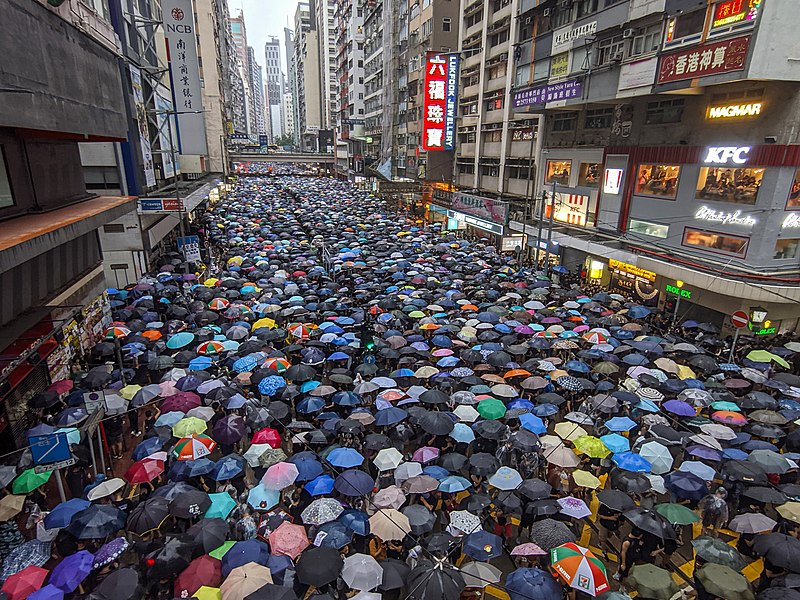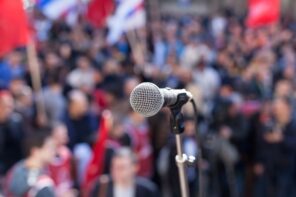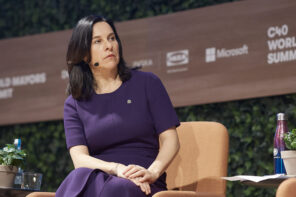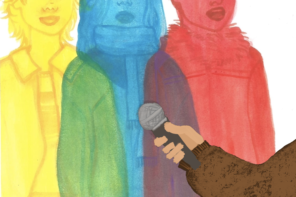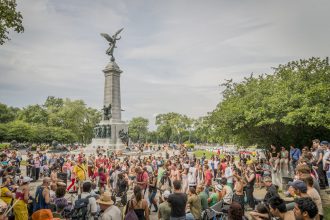“Good! Go beat them up!”
I was at a family dinner at a restaurant this past summer when I heard my great-aunt say these words. The Cantonese news station was being broadcasted on the giant television screen in front of our table. Segment after segment showed grainy videos of police beating up protestors in Hong Kong. My family, who stem from Hong Kong, could not stop talking about the political situation, a topic they otherwise rarely addressed. It was their opinions, however, that really caught my attention and forced me to question my own preconceived thoughts about government, democracy, and the idea of finding common ground on political issues.
Justice and democracy are often viewed as an exclusively Western phenomenon. Even though in school I was never explicitly told that Western-style governments were inherently better than other forms, there was an undercurrent of superiority that ran through nearly every academic conversation. Whenever I watched the Chinese news with my grandparents, however, they would praise the accomplishments that the Communist government had made. It is important to note that I am not advocating for monarchy, authoritarianism, nor any other type of non-democratic government, for that matter. In fact, each form has its pros and cons, although some more than others. However, growing up in this environment made me confused as to why some people hold onto a sense of nostalgia when discussing non-democratic regimes.
For a long time, I didn’t understand why anyone would ever feel nostalgia for oppressive governments. Why would anyone want to live under constant fear?
Although my grandparents from Hong Kong grew up under British colonial rule, they were familiar with Western-style government. Even still, nowadays they will sometimes praise China’s authoritarianism. They claim that people cannot be trusted to decide who amasses power. Interestingly enough, my grandmother from South Korea, who experienced oppressive, racist colonial rule under the Japanese in World War II and the Korean War, is a true advocate for democracy. She views the North Korean regime with disgust. I wondered why my grandparents think so differently about this topic. For a long time, I didn’t understand why anyone would ever feel nostalgia for oppressive governments. Why would anyone want to live under constant fear?
After ruminating for the rest of the summer, I realized that I had only experienced a one-sided view on the subject. The only life I knew was under a relatively stable democracy in Canada, one in which I could criticize the government however much I wanted. But it was not until I began studying Eastern European history in university where I encountered similar nostalgia towards non-democracies.
In former eastern bloc countries, this nostalgia towards communist regimes derives in large part due to the stability and guarantees the state once gave to citizens (e.g., employment, health care, free education). After the collapse of the Soviet Union and the transition to free market economies, these benefits ultimately disappeared. Many elderly citizens who live in these formerly communist countries believe that their quality of life has greatly diminished since the regime change in the 1990s.
While my grandparents grew up in British Hong Kong, they were not held to the same standards or expectations as the white English. Colonial discrimination played a role in their views towards Western-style governments. While rights such as free speech, press, and religion created a society unafraid of the government, the way in which these democratic ideals were enforced in Hong Kong left a bitter taste in their mouths. From my grandparents’ experience, in order to thrive under colonial rule, for example, one had to learn English, preferably at a Anglican or Catholic school. If one wanted additional privileges from job connections or even to reserve a cemetery plot, one had to convert to some form of Christianity. It became clear to me that the issue was not as black and white as it once seemed. It wasn’t until I learned about my grandparents’ experiences in the East that I could begin to understand why one would criticize or have qualms with Western democracy.
Too often in civic education we are taught that one system is inherently “right” while the other is intrinsically “wrong.” In order to foster a greater sense of empathy and understanding between places and cultures, we need to begin evaluating and questioning our enshrined beliefs and biases.
Although distant from the above topic, and as odd as it may sound, take this controversy in the entertainment industry. Ellen Degeneres recently came under fire for her supposed friendship with former US President George W. Bush, as they were seen sitting together at a Dallas Cowboys football game. I argue that there are points to be made on both sides of the debate. Questions such as whether it is okay to have friends with differing political views than you, even if that friend happens to be a war criminal (as some would argue Bush to be) are ones that many of us struggle to reconcile and understand.
While there is a defining line between genuine understanding and empathy versus unfiltered kindness, an important feature when engaging in a debate is the ability to find common ground.
I think that this situation has opened up the conversation on how to come to an understanding of different political opinions. While there is a defining line between genuine understanding and empathy versus unfiltered kindness, an important feature when engaging in a debate is the ability to find common ground. While I do carry a different set of opinions from some members of my family, we have indeed worked towards finding some commonalities between our worldviews, including recognizing the importance of equality and equity in the economic, political, and social spheres. All humans deserve to have these needs met; however, it is the approach to how we should go about achieving these means where we part ways.
As there are divisions in the way we view how society should function, it is important in many aspects of political discourse to find commonalities, as well as come to a genuine understanding as to why different people hold different beliefs. While there are times when it is excusable and just to call someone out for their views (such as incidents of extremist beliefs) and seal ourselves in our echo chambers, we need to more carefully examine situational context before we criticize others.
There seems to be no end in sight with the protests in Hong Kong. However, instead of rolling my eyes at my grandparents views when I visit them or dismissing their nostalgia as ignorant, I now have a deeper understanding of where their beliefs stem from, which has helped foster empathy.

